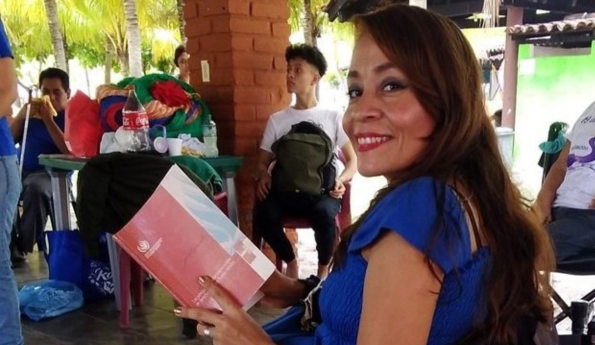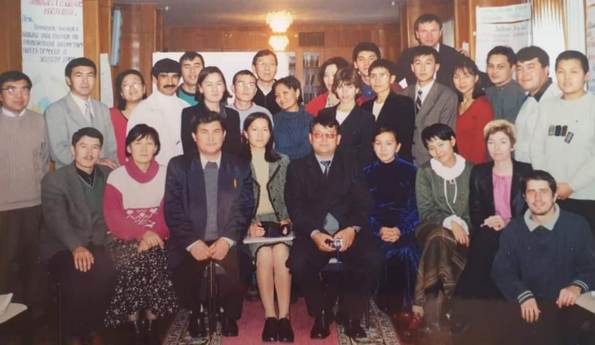This story is part of our series on Counterpart’s Food for Progress program in Guatemala.
Guatemala, the “Land of the Trees,” is famous for its vast rainforests, steep volcanoes, and ancient ruins. Just smaller than Pennsylvania, its largest industry is agriculture with nearly 50% of Guatemalans involved in various vegetable crops, coffee, sugar and bananas. With so many people dependent on this industry, farmers often work together, organizing into groups ranging from networks of neighbors called “CADERs,” to regional associations and co-ops, to national associations and federations. Counterpart is working across all of these levels to ensure that every farmer in Guatemala has the access to the skills, networks, and partnerships necessary to provide for their families.
The smallest of these organizations, a CADER is an informal group of about 10-30 men and women. With an interest in pooling resources to achieve greater results, each CADER is registered with Guatemala’s Ministry of Agriculture, Livestock and Food (MAGA). These groups are vitally important to the economic development of Guatemala and the Western Highlands in particular.
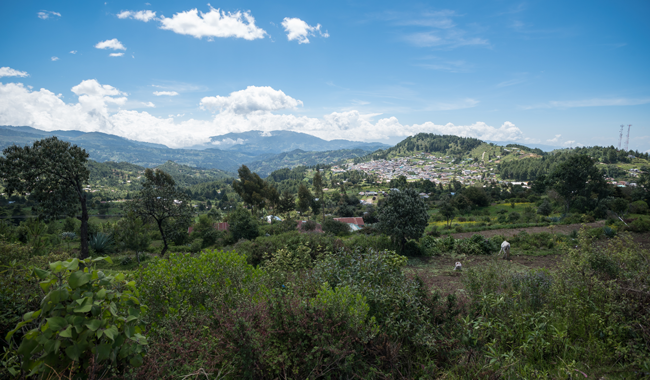
A view of Guatemala’s Western Highlands. Coffee has to be grown at a high elevation and crops grown at 1500 meters or more above sea level are considered more desirable, producing “hard beans” with a richer, more nuanced flavor profile.
The region has long been eager to expand and improve crop production, particularly in coffee. Looking for a way to help breathe new life into the agricultural industry of Guatemala, in 2012, Counterpart International was instrumental in revitalizing the dormant MAGA National Rural Extension System. Through this partnership, Counterpart and MAGA work hand in hand with other partners like the University of San Carlos to provide training to the MAGA Extension Agents, who are then deployed to rural communities to provide technical assistance to farmers.
Counterpart’s technicians in the Western Highlands support the Extension Agent’s work by hosting additional public workshops in communities focused on drought resistant agriculture techniques, sustainable farming practices, marketing, and more, depending on the specific, personalized needs that each community identifies for themselves.
New Seeds…New Growth…
CADER Caserio Valenton II: Grupo Flor del Café
For years, the 11 members of the Grupo Flor del Café CADER realized their coffee crop was struggling because of the quality of their coffee seeds. After ten years, production was down and both the quality and quantity of their coffee was in decline. On the recommendation of their MAGA Extension Agent, Grupo Flor del Café applied for a Counterpart technical assistance grant, giving them the ability to purchase new disease-resistant improved coffee seeds. The results have been transformative.
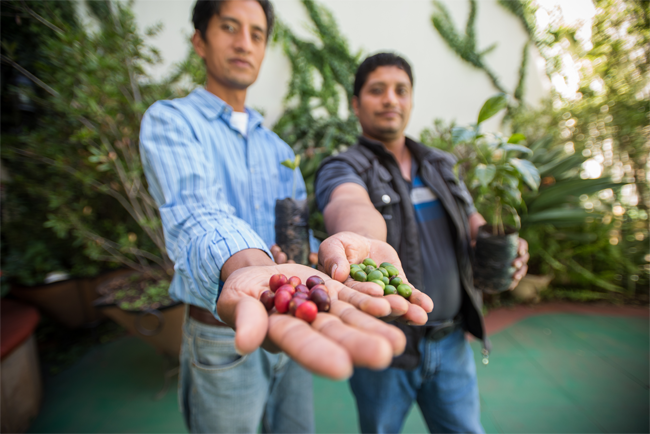
Two leaders of the Grupo Flor del Café CADER started their group with neighbors 10 years ago. Here they show the difference between unripe, green coffee beans and the ripe, red “cherries” that are ready for harvest. Grupo Flor del Café members handpick beans daily during harvest season to achieve the highest quality coffee bean.
By planting the new seeds, Grupo Flor del Café was able to grow 7,500 plants last year, which will ultimately produce 6,000 pounds of coffee. Those will be sold at $125 per 100 pound bag of coffee. While it typically takes coffee plants three years to produce useable coffee, this CADER is already harvesting beans in the second year — a testament to the sustainable agriculture training they received and the superiority of the new seed.
“Our neighbors have watched our work and want to be part of our group now,” said one of the CADER leaders, “We are proud of our product and excited to grow bigger, with more members, and produce even more coffee to sell.”
Counterpart also works closely with MAGA agents to facilitate learning exchanges between Grupo Flor del Café and other coffee-producers in the region, allowing for the regional sharing of skills and resources. Like most CADER’s, Grupo Flor del Café hopes to continue improving and increasing their production. In the future, in partnership with MAGA and other coffee CADERs, they say they aspire to form or join a Co-Op (where the price for coffee is typically closer to $200-300 per 100 lbs). This would give them even greater market access, with the potential for higher income for their communities and families.
While Grupo Flor del Cafe faced challenges because of its seeds, others communities work with Counterpart to tackle different issues, and work together to build solutions. In Guatemala, Counterpart works across the supply chain, partnering with organizations ranging from small CADERs like Grupo Flor del Café, all the way up to large, formal Associations, like coffee production groups ASASAPNE and ANACAFE.
Working up the supply chain:
Asociacio de Agricultores El Esfuerzo de San Pedro Necta (ASASAPNE) and Guatemala National Coffee Association (ANACAFE)
ASASAPNE is a regional coffee Association also based in the Western Highlands, and has been in operation for 30 years. They boast 260 members, 60 of which are women. Despite this long history, they have historically struggled in several areas — including leadership, financial management and marketing. Realizing that these areas were limiting their ability to grow and flourish, they reached out to Counterpart for support and training to improve their professional development. With this support, ASASAPNE was able to hire a consultant to develop organizational policies and manuals, as well as design improved marketing tools, materials, and collateral. Like Grupo Flor del Café, the members of ASASAPNE have big dreams for their organization: they strive to continue growing and increasing their production and market access, improving their organizational development and building stronger networks with larger Associations in order to ultimately have access to the US market.
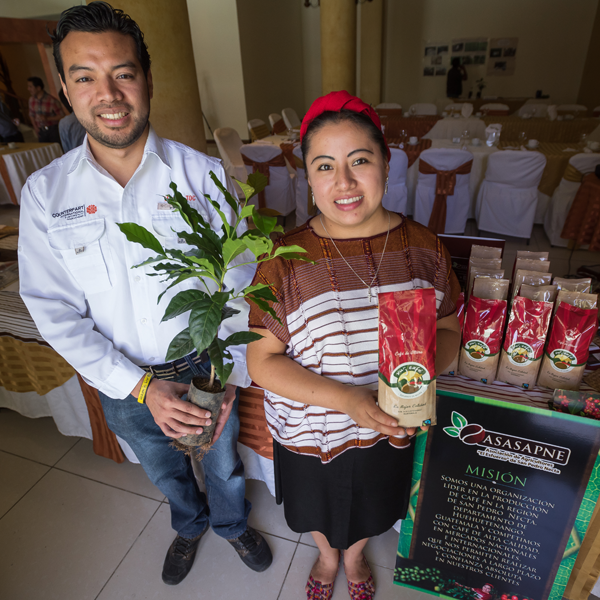
One of the 60 female members of ASASAPNE with a Counterpart technician, showcasing some of the new branding and marketing materials that were developed for selling their coffee at markets and trade shows.
ANACAFE, the National Coffee Association of Guatemala, is building a partnership with Counterpart to expand their impact in-country. Well established in Guatemala with strong relationships with both coffee producers around the world and international development organizations working to improve the coffee industry in Guatemala, Counterpart has been working with ANACAFE to train their trainers, and provides small grants to ANACAFE members. ANACAFE offers a wide range of services to its members, including a Barista school, marketing and external relations technical support, a tasting lab, a soil analysis lab, and market/pricing analysis, in addition to Corporate Social Responsibility (CSR) efforts focused on education, food security, and public health. With Counterpart’s support, ANACAFE members have been able to procure improved fertilizers, fungicides, and new, more advanced equipment — all resulting in higher quality coffee production and, ultimately, higher income and better lives for the Association members and their families.
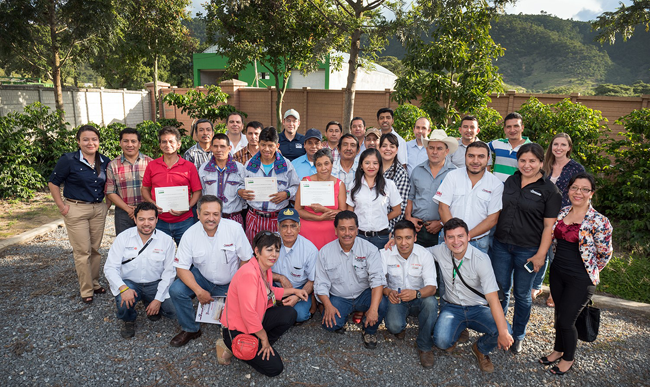
Six coffee farmers and ANACAFE members were recently awarded technical assistance grants from Counterpart International. Here, the grantees celebrate with Counterpart and ANACAFE staff after the grant award ceremony.
To date in Guatemala, Counterpart has provided 226 organizational development trainings to farmers, and 124 farming cooperatives across all levels of production in industries ranging from coffee to vegetables to livestock. Counterpart looks forward to working with these communities, in partnership with USDA, for many years to come. We are committed to helping these organizations increase sustainable agriculture yields that will improve family nutrition and increase family incomes.
With generous support from the United States Department of Agriculture (USDA), Counterpart International is working in more than 35 communities across Guatemala, providing training and capacity building to increase sustainable agricultural techniques in rural communities, increase production, and improve livelihoods of indigenous rural farmers. From August 7th through 13th, Alexandra Frank, Counterpart’s Senior Officer for External Relations, traveled to Guatemala to visit a variety of our Food for Progress program sites, and hear stories from program beneficiaries and partners throughout Guatemala City and the Western Highlands. During the next eight weeks, we will feature stories and photos of our amazing Guatemalan partners on our blog every Tuesday.



